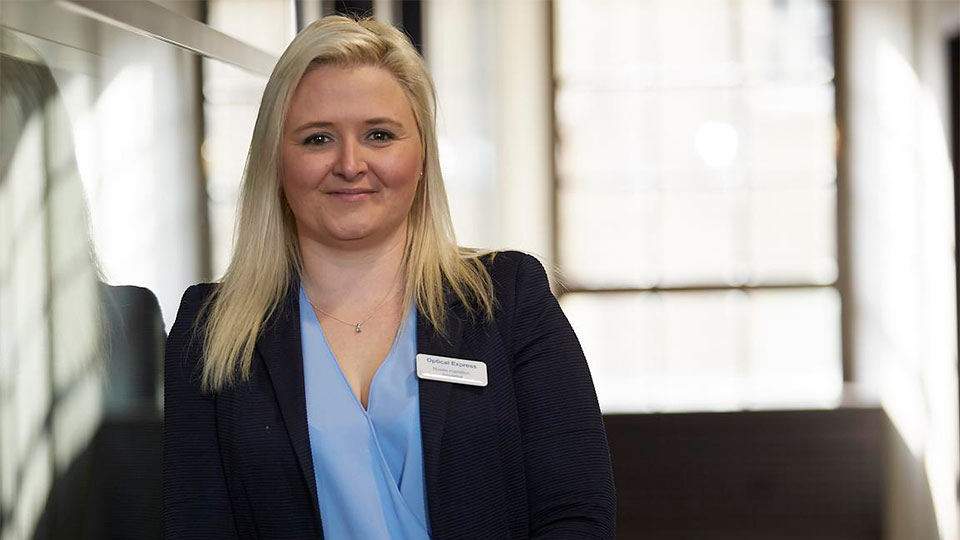- OT
- Life in practice
- Career development
- The benefits of being IP trained
The benefits of being IP trained
Optical Express optometrist, Noelle Hamilton, talks to OT about why she decided to train to become an independent prescribing optometrist

28 March 2019
In 2017 Optical Express announced that it was investing a six-figure sum to provide its optometrists with the opportunity to become independent prescribers.
Partnering with Glasgow Caledonian University to establish a one-year independent prescribing (IP) course designed specifically for its optometrists, in May 2017 the first cohort of 22 Optical Express optometrists enrolled.
Having played a pivotal role in the introduction of the initiative, clinical services director at Optical Express, Stephen Hannan, who is IP qualified himself, says he has seen first-hand the benefits that the qualification brings to patient care.
Speaking about the investment, Mr Hannan said: “At Optical Express we’re committed to giving patients the best services, and to supporting the skills development of all our expert clinicians. Therefore, we are proud to sponsor this course at Glasgow Caledonian University, as well as the provision of a clinical placement to help our optometrists become IP qualified.”
One of the first optometrists to enrol and successfully complete the Optical Express course and become an IP optometrist was Noelle Hamilton. An optometrist with 17 years’ experience, Ms Hamilton has worked at Optical Express for over a decade and saw becoming an IP optometrist as the next step in her career. She speaks to OT about her journey to becoming an IP optometrist.
What made you want to become an IP optometrist?
Training to be an IP seemed like the next logical career step for me as an optometrist. Optometry seems to be advancing in that direction and with the increasing pressure and workload on the NHS, I think optometrists are going to need to be able to deal with and treat more conditions in the community in the future.
I also felt that being an IP optometrist would allow me to better support my patients, enabling me to offer them an enhanced level of service.
Having now completed the course, being an IP optometrist has given me more confidence in my ability to be able to manage a wide range of conditions for the patient.
Optometry seems to be advancing in that direction and with the increasing pressure and workload on the NHS, I think optometrists are going to need to be able to deal with and treat more conditions in the community in the future
What did the IP course involve?
It was year-long course, with two days at Glasgow Caledonian University alongside a significant amount of independent study. To complement the university lectures, Optical Express provided in-house training also. These courses were really helpful as you were learning alongside your peers who were also going through the course.
Once the university-based course was completed, there was lengthy compulsory clinical training that involved 24 sessions, after which you could apply for your final exam.
Completing this training with Optical Express meant that I could do my clinical sessions with in-house ophthalmologists when I was in clinic. I think I would have struggled to arrange these sessions at a local hospital and do them on my days off.
How did you find balancing the workload and working full-time?
It is tough and it takes some good time management. You have to put the work in and at times, if I’m honest, it was challenging trying to fit study in with everyday work and your personal life. However, if being an IP optometrist is something that you want to do, you will be able to find the time to study a little bit every week, and it will be worth it.

What business benefits has being an IP optometrist brought?
Optical Express wants to be the complete eye care provider, providing patients with everything from glasses and contact lenses to refractive surgery. If they also want to be the first port of call for patients with any eye condition, having an IP qualified workforce ensures that its optometrists can manage as many conditions as possible in practice.
What did you most enjoy about becoming IP qualified and why?
I really loved the course and feel that being an IP optometrist allows you to provide better care for the patient. Since qualifying, I use my new skills every day in practice. It means I don't always have to refer patients on for further assessment because I can treat and manage them in the community.
What would you say to encourage other optometrists to become IP qualified?
It has improved my clinical ability and improved my confidence with patients. I think that this is the direction that optometry is heading and that at some point every optometrist will be IP-qualified. Therefore, it's safer to do it now rather than later.
Advertisement


Comments (1)
You must be logged in to join the discussion. Log in
Nicholas Rumney25 June 2019
Congratulations and well done all. It’s a game changer. Achieving IP should be the natural aspiration of every single MECS optom and we need to ask why this is taking so long to become the norm. 800 in 11 years is simply too slow.
Report Like 358